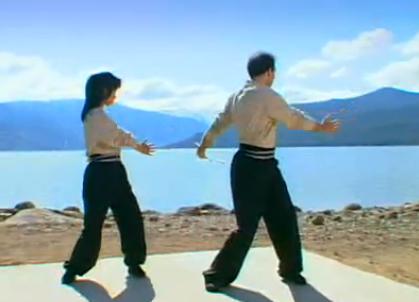Zen and Chi Gong (PART 1 OF 3)


Hi Kato!
Thanks a lot
for those video clips.
<iframe width="350" height="349" src="http://www.youtube.com/embed/HvN94MZqfyk" frameborder="0" allowfullscreen></iframe>
From: diane03760@vancouver.ca
To: barclay1720@aol.com
Date:Wed, May 18, 2011 4:47 pm.
Hi Kato,
Thanks so much .. this is all so very interesting.
One of these days I'm going to take a chi gong (気功) class here at the WECC(Westend Community Centre).

I remember taking one years ago.
In the meantime, I do my yoga every day.
and have done for years.
I used to be a yoga teacher.


I go to the gym three times a week,
walk the seawall with my group every Tuesday
and swim and hike in the mountains when I get the chance.




Hopefully, this will keep me in shape for years to come!

Thomas Jefferson, one of the early USA Presidents (he penned the Declaration of Independence) and who was a very learned man, said that "every man should devote his afternoons to exercise and recreation as it is as important as reading."
In fact, he said, "It's even more important because our health is worth more than learning."
That's for sure!
He impressed me.
Of course, learning is important, too ... but who's got the time for everything?!
Thanks again for these video clips.
They're wonderful.

Love, Diane ~
SOURCE: "Yoga and Happiness"
(May 22, 2011)

Kato, how come you've brought up my old mail?

You used to be a yoga teacher, and now you're taking a chi gong (気功) class.
Yes, I am.
No wonder you're in a good shape. And I'm pretty sure you'll be in shape for years to come.

You are in
a good shape!


I really hope so.

what kind of lesson are you taking in the class?
I'll show you in the following video.

(chigong90.jpg)
<iframe width="500" height="349" src="http://www.youtube.com/embed/ncHziAUvM8I" frameborder="0" allowfullscreen></iframe>

Wow! ... quite mysterious movements...like those of Tai chi.
Tai chi (太極拳)
T'ai chi ch'uan (simplified Chinese: 太极拳; traditional Chinese: 太極拳), often shortened to T'ai chi or Tai chi in the West, is a type of internal Chinese martial art practiced for both its defense training and its health benefits.
It is also typically practiced for a variety of other personal reasons: its hard and soft martial art technique, demonstration competitions, and longevity.
As a consequence, a multitude of training forms exist, both traditional and modern, which correspond to those aims.
Some of t'ai chi ch'uan's training forms are especially known for being practiced at what most people categorize as slow movement.
Today, t'ai chi ch'uan has spread worldwide.
Most modern styles of t'ai chi ch'uan trace their development to at least one of the five traditional schools: Chen, Yang, Wu/Hao, Wu, and Sun.
The term t'ai chi ch'uan translates as "supreme ultimate fist", "boundless fist", "great extremes boxing", or simply "the ultimate."
Note that chi in this instance is the Wade-Giles transliteration of the Pinyin jí, and is distinct from qì (or chi 氣), which means "life energy".
The concept of the Taiji ("supreme ultimate") appears in both Taoist and Confucian Chinese philosophy, where it represents the fusion or mother of Yin and Yang into a single Ultimate, represented by the Taijitu symbol.
T'ai chi theory and practice evolved in agreement with many Chinese philosophical principles, including those of Taoism and Confucianism.
T'ai chi training involves five elements, nei gung, tui shou (response drills), sanshou (self defence techniques), weapons, and solo hand routines, known as forms (套路 taolu).
While t'ai chi ch'uan is typified by some for its slow movements, many t'ai chi styles (including the three most popular - Yang, Wu, and Chen) have secondary forms of a faster pace.
Some traditional schools of t'ai chi teach partner exercises known as "pushing hands", and martial applications of the forms' postures.
<iframe width="400" height="315" src="http://www.youtube.com/embed/nNWPk6tYoUM" frameborder="0" allowfullscreen></iframe>
SOURCE: "T'ai chi ch'uan"
Wikipedia, the free encyclopedia

Kato, why don't you join my class? You could improve your health. You know, Kato, health is worth more than learning.

I know...I know...I will join your class some day.
You always say that, but your "some day" seems 100 years down the road.
But Diane, you said who's got the time for everything, didn't you? I don't have the time for everything.
I know. It seemes to me that you're always writing articles in the library. When you are not writing, then you're watching DVDs. Writing and learning is important, but, as Thomas Jefferson said, every man should devote his afternoons to exercise and recreation as it is as important as reading, learning, and writing.
You sounds like my teacher in the elementary school.
Take my advice, Kato, and join my class, will you?
Yes, yes, yes,... some day, but actually, I'm a Zen practitioner. When I've got some spare time, I always practise Zen.
Zen is quite static to me.
Static to you, Diane?
Yes, it is. Not dynamic, I mean, Zen is doing nothing---sitting still. I don't know how it could possibly improve your health and mind.
Have you ever heard of Bodhidharma?
Yes, you told me about him the other day.
(To be followed)